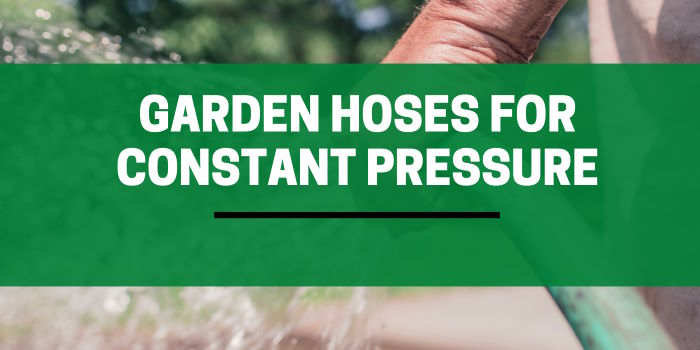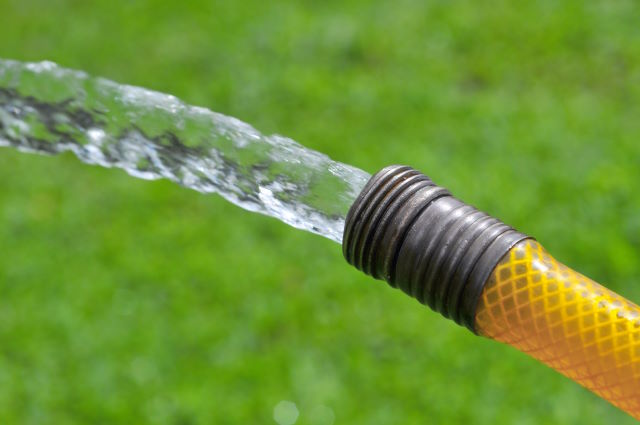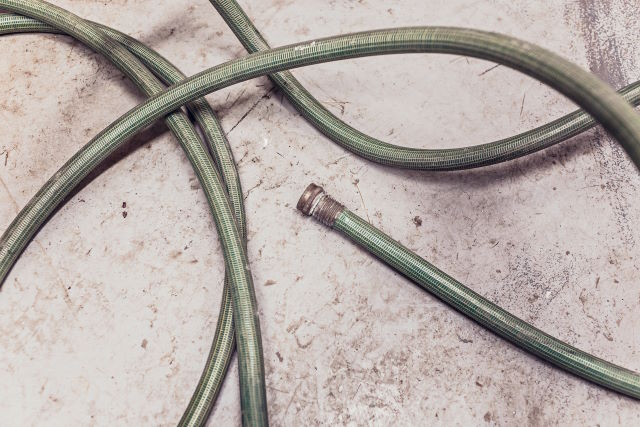
When it comes to maintaining your garden, a reliable and durable hose is an essential tool. However, not all garden hoses are created equal, especially when you require one to withstand constant water pressure.
In this article, we’ll explore the benefits of using a garden hose under constant pressure, why standard hoses may not be the best choice, and how to pick the right one for your needs.
Contents
What Do We Mean By “Constant Pressure”?
Constant pressure refers to a continuous water flow through a hose over an extended period of time. There are many tasks where a hose may be under this type of continuous pressure such as feeding a water fountain, a pool, or supplying water to an RV.

It may also mean that a hose is just holding the pressure and is always ready to use. If you are using the hose regularly, turning off the water supply when it is not in use may be inconvenient.
Why Standard Garden Hoses Don’t Work
Standard garden hoses, such as cheap vinyl or lightweight rubber hoses, may not be suitable for constant pressure applications.
Standard hoses often have a lower pressure rating, meaning they can’t handle the stress of continuous water flow.
You may be able to get away with a normal hose if the continuous pressure is low. But at constant high pressure, they may develop hose leaks or bursts, ultimately leading to shorter lifespans and increasing the need for frequent replacements.
Best Hoses To Use For Constant Pressure
Contractor Grade Hose
Contractor-grade hoses are known for their durability and ability to handle water pressure.

These heavy-duty garden hoses are typically made from rubber or reinforced materials that provide long-term durability and resistance to extreme temperatures.
A contractor hose will also usually feature strong fittings that help prevent leaks. Note that these are made of heavier hose materials making them less portable than standard hoses.
RV Water Hose
RV water hoses are specifically designed for use in recreational vehicles but can be an excellent choice for your garden as well.
They are made from durable materials that are usually drinking water safe and can withstand both cold and hot temperatures. Additionally, they often have a high gallon-per-minute flow rate to ensure efficient water delivery.
Hose Components & Fitting For Constant Pressure Applications
If you’re working on a project that requires connecting two hoses or setting up a new spigot, you’ll definitely want to invest in top-quality fittings and couplings. Trust me, it makes a huge difference in the long term!
Avoid plastic fittings.
Brass is the way to go since it doesn’t rust and is less likely to corrode. Opt for cast brass fittings instead of stamped brass ones. Although they might cost a bit more, they’re far sturdier and will save you headaches in the long run.
Watch out for aluminum connectors as they can become stuck on a brass spigot.
Don’t forget to wrap some plumber’s tape around the threads that connect your durable hose to the fittings before connecting them. This extra layer of leak protection ensures a secure and reliable connection. It also lubricates the threads, making them easier to detach later.
How To Pick The Right Garden Hose for Constant Pressure
When choosing the perfect garden hose to withstand constant pressure, consider the following factors:
Hose Diameter
The diameter of the hose pipe is crucial for determining its water flow rate and ability to handle constant pressure.
Consider the hose’s flow rate, measured in gallons per minute (GPM).
A larger diameter hose, such as a 3/4-inch hose rather than a 5/8 hose, will provide better water flow and be less likely to experience pressure-related issues.
Material Type
The type and length of the hose will impact its overall durability and ease of use. Heavy-duty garden hoses made from rubber or polyurethane are excellent choices for constant-pressure applications.
A well-reinforced vinyl hose may also be suitable. Additionally, ensure the hose is long enough to comfortably reach all areas of your garden.
Flow rate and extreme temperatures
and its ability to handle extreme temperatures.
A hose with a higher flow rate will provide more efficient water delivery, while a hose designed to withstand both cold and hot temperatures will be more versatile and long-lasting.
Benefits Of Using A Higher-Grade Hose
Using a garden hose designed for constant pressure offers several advantages:
- Reduced risk of hose leaks and bursts: Hoses designed to withstand constant pressure are less likely to develop leaks or bursts due to pressure build-up.
- Drinking Water: RV hoses are often drinking water safe.
Final Thoughts
A garden hose capable of handling constant pressure is essential for efficient watering and various other tasks around your garden.
By considering factors such as hose diameter, type, length, flow rate, and temperature resistance, you can find the perfect hose to meet your needs. Ultimately, investing in a durable hose designed for constant pressure will save you time, effort, and money in the long run.
FAQs
What is the best material for a garden hose under constant pressure?
Rubber, polyurethane, and reinforced vinyl are all excellent materials for hoses that need to withstand constant pressure. These materials provide durability and resistance to extreme temperatures.
Are expandable hoses suitable for constant pressure?
Expandable hoses may not be the best choice for constant pressure applications, as they tend to have lower pressure ratings and can be more prone to leaks or bursts.
How can I prevent hose kinks and tangles when using a garden hose under constant pressure?
Choose a hose with a flexible and lightweight material that resists kinking and tangling. Additionally, make sure to properly store your hose when not in use by using a hose reel or storage container.
What type of fittings should I look for in a constant-pressure garden hose?
Brass or aluminum fittings are strong, corrosion-resistant, and less likely to leak, making them a great choice for garden hoses under constant pressure.
Can I use a standard garden hose nozzle with a hose designed for constant pressure?
Yes, you can use a standard garden hose nozzle with a constant pressure hose. However, it’s essential to ensure that the nozzle is also designed to handle the increased pressure.
